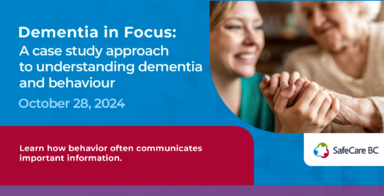Instructions
Choose a scenario, read it out loud, and use the guiding questions and key discussion points to discuss communicating with people living with dementia. If possible, hold this safety huddle in a relevant location (activity room, dining room, etc.) to put yourself in the shoes of someone with dementia.
Learning outcomes
After this huddle, staff will be able to:
- Explain how dementia may affect communication.
- Apply person-centred care approaches to communicating with someone living with dementia.
- Identify steps to take if there is a new change in a person’s behaviour or ability to communicate.
Guiding questions
- What changes could the resident/client be experiencing because of their dementia?
- What person-centred care approaches may have more success in this scenario?
- When a person demonstrates a new change in their behaviours or communication ability, how should those changes be tracked and reported?
Scenario A
A resident is writing a card to their grandchild in a common area, something they do every month. You notice they are having some difficulty writing. They raise the pen towards you and say, “I need a different crayon, mine is broken!” You understand they want a new pen, but you haven’t noticed them using the wrong word before. You confirm the pen is working and pass it back to them. The resident is still unable to write, throws the pen and paper off the table, and asks to go back to their room. You have never seen this kind of behaviour from them before, so you kindly pick up the pen and paper and assist them back to their room
Scenario B
You are performing a weekly visit for a client. One of your routines is for them to read that day’s newspaper aloud, and attempt some of the crossword. You hand them the newspaper. A few seconds after unfolding it, they begin swearing and yelling at you that they don’t read the newspaper. You understand this client to be very polite—so this is a change in their behaviour. You respect they don’t want to read the newspaper and move on to the next part of your routine.
Notes to the huddle leader
People living with dementia can experience changes in how they understand and process language, which can affect how they communicate.
In Scenario A, the resident struggles with writing and uses an incorrect word to refer to their pen. They write regularly, so they should be able to do so easily and know that they write with a pen. These changes could be attributed to the conditions of agraphia and anomia.
Agraphia causes difficulty writing, and anomia causes mix-ups with the names of objects or people—often a word that has something in common with the intended object. In this case, the resident refers to their pen as a crayon, both of which can be used for writing.
There is no one solution to working with people living with dementia. By knowing the people you work for, you can find solutions that work for them, and that solution may not work for someone else. In Scenario A, you could ask the resident if they would like:
- A family member or friend to write for them?
- You to write for them?
- To use a speech-to-text program?
In Scenario B, a polite client swears at you and refuses to read the newspaper, which is part of your routine with them. These changes could be attributed to the conditions of alexia and loss of filter.
Dementia causes damage to the frontal lobe over time, and people living with dementia may use inappropriate or offensive language because they can no longer process what is socially acceptable. Alexia causes people to lose their ability to understand written language.
This client wants to read the newspaper, but it is frustrating to be unable to, and they lack the filter that prevents them from yelling and swearing.
In Scenario B, you could:
- Ask who should read the paper. “Who should read the paper today? You or me?”
- Offer to turn on the radio or listen to a news podcast.
- Read the crossword clues out loud, pausing for them to answer.
When you notice an observable change in someone living with dementia, make sure to report those changes to your supervisor as soon as possible.
Although their ability to communicate changes over time, people living with dementia are always able to communicate. By having some patience and knowing the interests and preferences of the people you are working with, you can make your time together more enjoyable and reduce the likelihood of responsive behaviours.

























